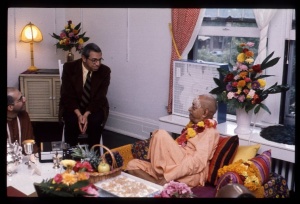CC Adi 3.66 (1975): Difference between revisions
(Vanibot #0027: CCMirror - Mirror CC's 1996 edition to form a basis for 1975) |
(Vanibot #0020: VersionCompareLinker - added a link to the Version Compare feature) |
||
| Line 2: | Line 2: | ||
<div style="float:left">'''[[Sri Caitanya-caritamrta (1975)|Śrī Caitanya-caritāmṛta (1975)]] - [[CC Adi (1975)|Ādi-līlā]] - [[CC Adi 3 (1975)|Chapter 3: The External Reasons for the Appearance of Śrī Caitanya Mahāprabhu]]'''</div> | <div style="float:left">'''[[Sri Caitanya-caritamrta (1975)|Śrī Caitanya-caritāmṛta (1975)]] - [[CC Adi (1975)|Ādi-līlā]] - [[CC Adi 3 (1975)|Chapter 3: The External Reasons for the Appearance of Śrī Caitanya Mahāprabhu]]'''</div> | ||
<div style="float:right">[[File:Go-previous.png|link=CC Adi 3.65 (1975)|Ādi-līlā 3.65]] '''[[CC Adi 3.65 (1975)|Ādi-līlā 3.65]] - [[CC Adi 3.67 (1975)|Ādi-līlā 3.67]]''' [[File:Go-next.png|link=CC Adi 3.67 (1975)|Ādi-līlā 3.67]]</div> | <div style="float:right">[[File:Go-previous.png|link=CC Adi 3.65 (1975)|Ādi-līlā 3.65]] '''[[CC Adi 3.65 (1975)|Ādi-līlā 3.65]] - [[CC Adi 3.67 (1975)|Ādi-līlā 3.67]]''' [[File:Go-next.png|link=CC Adi 3.67 (1975)|Ādi-līlā 3.67]]</div> | ||
{{CompareVersions|CC|Adi 3.66|CC 1975|CC 1996}} | |||
{{RandomImage}} | {{RandomImage}} | ||
==== TEXT 66 ==== | ==== TEXT 66 ==== | ||
| Line 20: | Line 19: | ||
<div class="synonyms"> | <div class="synonyms"> | ||
sadā—always; upāsyaḥ—worshipable; śrīmān—beautiful; dhṛta—who accepted; manuja-kāyaiḥ—the bodies of men; pranayitām—love; vahadbhiḥ—who were bearing; giḥ-vāṇaiḥ—by the demigods; giriśa—Lord Śiva; parameṣṭhi—Lord Brahmā; prabhṛtibhiḥ—headed by; sva-bhaktebhyaḥ—unto His own devotees; śuddhām—pure; nija-bhajana—of His own worship; mudrām—the mark; upadiśan—instructing; saḥ—He; caitanyaḥ—Lord Caitanya; kim—what; me—my; punaḥ—again; api—certainly; | sadā—always; upāsyaḥ—worshipable; śrīmān—beautiful; dhṛta—who accepted; manuja-kāyaiḥ—the bodies of men; pranayitām—love; vahadbhiḥ—who were bearing; giḥ-vāṇaiḥ—by the demigods; giriśa—Lord Śiva; parameṣṭhi—Lord Brahmā; prabhṛtibhiḥ—headed by; sva-bhaktebhyaḥ—unto His own devotees; śuddhām—pure; nija-bhajana—of His own worship; mudrām—the mark; upadiśan—instructing; saḥ—He; caitanyaḥ—Lord Caitanya; kim—what; me—my; punaḥ—again; api—certainly; drśoḥ—of the two eyes; yāsyati—He will go; padam—to the abode. | ||
</div> | </div> | ||
| Line 27: | Line 26: | ||
<div class="translation"> | <div class="translation"> | ||
"Lord Śrī Caitanya Mahāprabhu is always the most worshipable Deity of the demigods, including Lord Śiva and Lord Brahmā, who came in the garb of ordinary men, bearing love for Him. He instructs His own pure devotional service to His own devotees. Will He again be the object of my vision?" | |||
</div> | </div> | ||
Latest revision as of 17:23, 26 January 2020

A.C. Bhaktivedanta Swami Prabhupada
TEXT 66
- sadopāsyaḥ śrīmān dhṛta-manuja-kāyaiḥ praṇayitāṁ
- vahadbhir gīr-vāṇair giriśa-parameṣṭhi-prabhṛtibhiḥ
- sva-bhaktebhyaḥ śuddhāṁ nija-bhajana-mudrām upadiśan
- sa caitanyaḥ kiṁ me punar api dṛśor yāsyati padam
SYNONYMS
sadā—always; upāsyaḥ—worshipable; śrīmān—beautiful; dhṛta—who accepted; manuja-kāyaiḥ—the bodies of men; pranayitām—love; vahadbhiḥ—who were bearing; giḥ-vāṇaiḥ—by the demigods; giriśa—Lord Śiva; parameṣṭhi—Lord Brahmā; prabhṛtibhiḥ—headed by; sva-bhaktebhyaḥ—unto His own devotees; śuddhām—pure; nija-bhajana—of His own worship; mudrām—the mark; upadiśan—instructing; saḥ—He; caitanyaḥ—Lord Caitanya; kim—what; me—my; punaḥ—again; api—certainly; drśoḥ—of the two eyes; yāsyati—He will go; padam—to the abode.
TRANSLATION
"Lord Śrī Caitanya Mahāprabhu is always the most worshipable Deity of the demigods, including Lord Śiva and Lord Brahmā, who came in the garb of ordinary men, bearing love for Him. He instructs His own pure devotional service to His own devotees. Will He again be the object of my vision?"